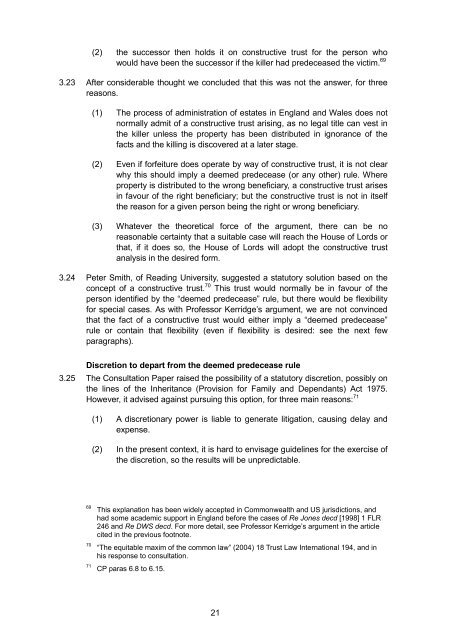The Forfeiture Rule and the Law of Succession ... - Law Commission
The Forfeiture Rule and the Law of Succession ... - Law Commission
The Forfeiture Rule and the Law of Succession ... - Law Commission
Create successful ePaper yourself
Turn your PDF publications into a flip-book with our unique Google optimized e-Paper software.
(2) <strong>the</strong> successor <strong>the</strong>n holds it on constructive trust for <strong>the</strong> person who<br />
would have been <strong>the</strong> successor if <strong>the</strong> killer had predeceased <strong>the</strong> victim. 69<br />
3.23 After considerable thought we concluded that this was not <strong>the</strong> answer, for three<br />
reasons.<br />
(1) <strong>The</strong> process <strong>of</strong> administration <strong>of</strong> estates in Engl<strong>and</strong> <strong>and</strong> Wales does not<br />
normally admit <strong>of</strong> a constructive trust arising, as no legal title can vest in<br />
<strong>the</strong> killer unless <strong>the</strong> property has been distributed in ignorance <strong>of</strong> <strong>the</strong><br />
facts <strong>and</strong> <strong>the</strong> killing is discovered at a later stage.<br />
(2) Even if forfeiture does operate by way <strong>of</strong> constructive trust, it is not clear<br />
why this should imply a deemed predecease (or any o<strong>the</strong>r) rule. Where<br />
property is distributed to <strong>the</strong> wrong beneficiary, a constructive trust arises<br />
in favour <strong>of</strong> <strong>the</strong> right beneficiary; but <strong>the</strong> constructive trust is not in itself<br />
<strong>the</strong> reason for a given person being <strong>the</strong> right or wrong beneficiary.<br />
(3) Whatever <strong>the</strong> <strong>the</strong>oretical force <strong>of</strong> <strong>the</strong> argument, <strong>the</strong>re can be no<br />
reasonable certainty that a suitable case will reach <strong>the</strong> House <strong>of</strong> Lords or<br />
that, if it does so, <strong>the</strong> House <strong>of</strong> Lords will adopt <strong>the</strong> constructive trust<br />
analysis in <strong>the</strong> desired form.<br />
3.24 Peter Smith, <strong>of</strong> Reading University, suggested a statutory solution based on <strong>the</strong><br />
concept <strong>of</strong> a constructive trust. 70 This trust would normally be in favour <strong>of</strong> <strong>the</strong><br />
person identified by <strong>the</strong> “deemed predecease” rule, but <strong>the</strong>re would be flexibility<br />
for special cases. As with Pr<strong>of</strong>essor Kerridge’s argument, we are not convinced<br />
that <strong>the</strong> fact <strong>of</strong> a constructive trust would ei<strong>the</strong>r imply a “deemed predecease”<br />
rule or contain that flexibility (even if flexibility is desired: see <strong>the</strong> next few<br />
paragraphs).<br />
Discretion to depart from <strong>the</strong> deemed predecease rule<br />
3.25 <strong>The</strong> Consultation Paper raised <strong>the</strong> possibility <strong>of</strong> a statutory discretion, possibly on<br />
<strong>the</strong> lines <strong>of</strong> <strong>the</strong> Inheritance (Provision for Family <strong>and</strong> Dependants) Act 1975.<br />
However, it advised against pursuing this option, for three main reasons: 71<br />
(1) A discretionary power is liable to generate litigation, causing delay <strong>and</strong><br />
expense.<br />
(2) In <strong>the</strong> present context, it is hard to envisage guidelines for <strong>the</strong> exercise <strong>of</strong><br />
<strong>the</strong> discretion, so <strong>the</strong> results will be unpredictable.<br />
69 This explanation has been widely accepted in Commonwealth <strong>and</strong> US jurisdictions, <strong>and</strong><br />
had some academic support in Engl<strong>and</strong> before <strong>the</strong> cases <strong>of</strong> Re Jones decd [1998] 1 FLR<br />
246 <strong>and</strong> Re DWS decd. For more detail, see Pr<strong>of</strong>essor Kerridge’s argument in <strong>the</strong> article<br />
cited in <strong>the</strong> previous footnote.<br />
70<br />
“<strong>The</strong> equitable maxim <strong>of</strong> <strong>the</strong> common law” (2004) 18 Trust <strong>Law</strong> International 194, <strong>and</strong> in<br />
his response to consultation.<br />
71 CP paras 6.8 to 6.15.<br />
21
















